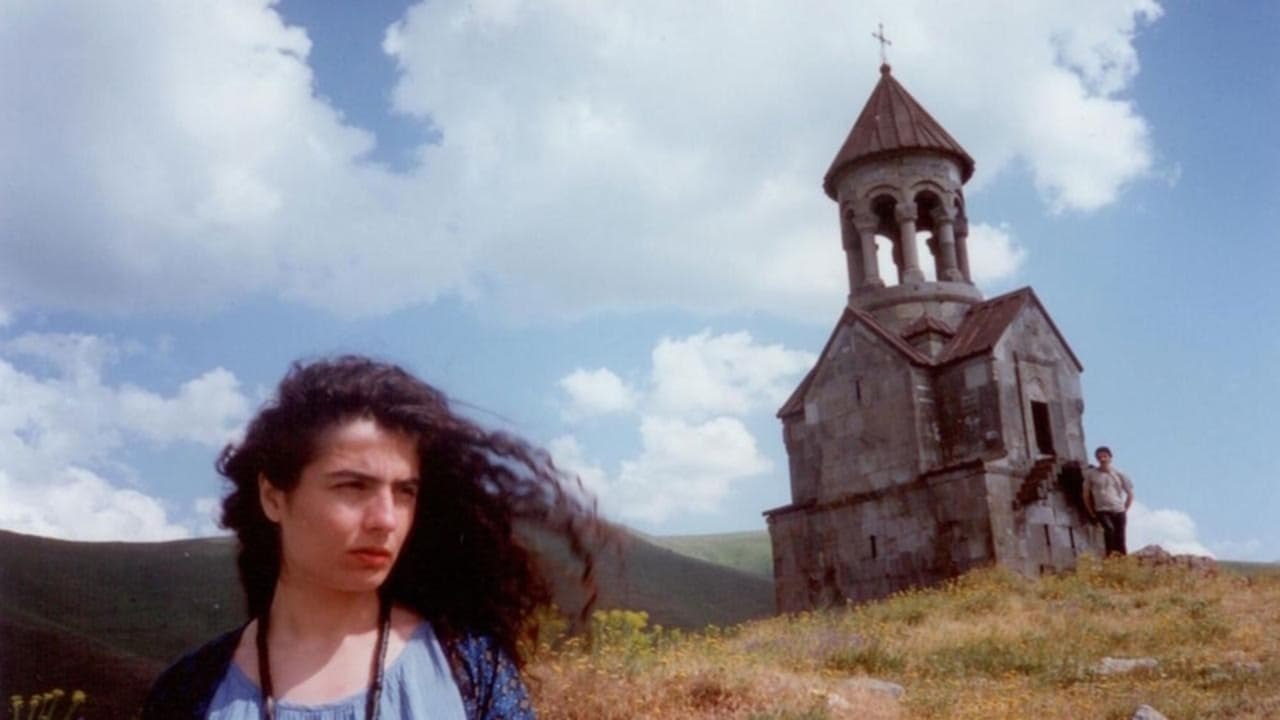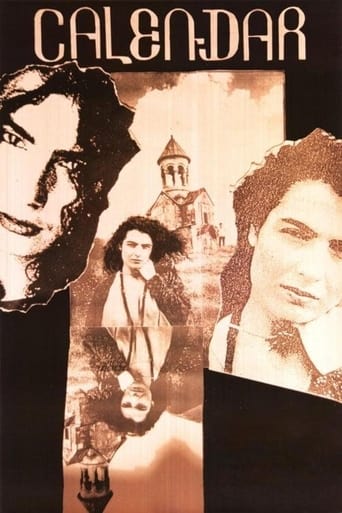


The performances transcend the film's tropes, grounding it in characters that feel more complete than this subgenre often produces.
... View MoreBlending excellent reporting and strong storytelling, this is a disturbing film truly stranger than fiction
... View MoreWhile it doesn't offer any answers, it both thrills and makes you think.
... View MoreThe storyline feels a little thin and moth-eaten in parts but this sequel is plenty of fun.
... View More'Calendar' is a slightly unusual film offering, written, filmed, directed, performed and possibly even fixed together with Scotch tape by Atom Egoyan, with this being my first trip into his cinematic world. It is a film that builds subtly, almost voyeuristically, so that the viewer finds themselves delving into the lives of its subjects to a level of prolonged discomfort, which reaches its crescendo as their true nature unfolds, all the while within some wonderful Armenian landscapes.The plot concerns a Canadian-Armenian photographer returned to the land of his ancestors with the job of photographing his homeland's most picturesque churches for a forthcoming calendar. He is accompanied by his Armenian wife, acting as translator for the local driver and guide they have hired to provide them with background information on all the sites visited. The unassuming beginning suggests that this is more or less the sum-total of the film, but with every new location, we slowly learn of the deeply fragmented relationship present between the married couple and the cause of the ensuing distance between them. The way in which the film is shot helps to underscore this gulf, with the photographer never seen with his wife in the same place at the same time. Indeed, we only see him some time after the calendar has been printed, while we only see her during the photoshoot, very tellingly only in the company of the driver.In some ways, 'Calendar' is rather difficult to watch, with the characters becoming more and more grotesque as the narrative progresses, especially that of the photographer, whose mounting jealousy (which could itself be described as a grotesque emotion) is exacerbated further by his unpleasant personality, particularly evident throughout scenes occurring in the present where, still emotionally in orbit around his estranged wife, he 'auditions' a long line of potential replacements (something that is not explicitly stated, so other viewers may have a different interpretation). Yet the film is shot in a very simple and effective way, which captures the claustrophobic mood of the piece while highlighting the wonderful natural backdrop. The camera is locked off in every scene, perhaps to mimic the still photography of the calendar itself, forcing the viewer to pay close attention to the tense and unspoken decay of the relationship. The still frame, accompanied by the subjects frequently in mid to long shot, further symbolize the distance felt by the man behind the camera and only serve to heighten his sense of isolation. These sequences are intercut with handicam footage of the characters' journey through Armenia, and yet despite providing the opportunity for motion, it is no more comforting, with the bluish tint and frequent lack of sound simply another form of isolation.Egoyan is clearly a skilled photographer, and he lovingly captures the churches with the warmth and texture you would expect to see on a professional calendar. This only serves to heighten the contrasting coldness and unease created by the characters themselves, which Egoyan as the photographer and Arsinee Khanjian as the wife expertly create. It's certainly not a pleasant cinematic adventure, but anyone who has experienced that phase of a relationship will at least know the horrible awkwardness created between two people who were once close, and the helpless feeling of loss as a result. Unfortunately, drawn as he is, it is well-nigh impossible to sympathize with the protagonist's predicament, though his wife is by no means a victim.The deeply personal discomfort, while real, does perhaps ensure 'Calendar' is probably not something I could sit through too often, but the effective minimalist approach on the production side and the jarring juxtaposition of cold, reserved knife-edge drama against the ultimately inconsequential polychromatic background has imbued a strong sense of the Atom Egoyan style. Certainly not a crowd-pleaser, but a director guaranteed to provoke thought. I'm certainly curious enough to explore some of his back catalogue some day. Actual rating 6 1/2 stars.
... View MoreAfter watching Egoyan's film several times, and being of a resident of Toronto, a city which trumpets its multi-cultural populace, I picked up on some references in Calendar which maybe others would not have.At one point, the Driver (Adamian), says his two Armenian-descent Canadian passengers (Egoyan and Khanjian) could not properly raise children anywhere but in Armenia. It's an instant dismissal of the fact that the passengers come from a different country; in the Driver's mind, since their ancestry is Armenian, they are Armenian.Later, the Photographer gives uncomfortable answers to his Translator wife as to why he's not moved by his subject matter--the old churches of Armenia. He states that he finds the churches interesting to the eye, but also that he feels little reverence for them culturally or historically. She seemingly cannot fathom why he would feels so; but also doesn't she seem to understand that her husband is Canadian, not Armenian.The most telling references come the end of the film where the Photographer and his final Guest talk about living in a new country. He tells of his difficulties when he, as a child, moved to Canada from Armenia and had difficulty in learning English. The Guest sympathizes with Egoyan, implying that she went through a similar experience, saying she "considers herself Egyptian"--yet BORN and RAISED in Canada! (It's also interesting to note that Khanjian, the Translator, speaks Engish with an accent. The Photographer speaks urbane, Toronto English.) Calendar revolves around the issue that the couple's trip to Armenia provokes a strong response in Khanjian's character, so much so that she discards her country and her husband.Consider the final scene with the Driver: he jokingly acts like a KGB official, and takes the couple's passports.
... View MoreI don't usually give movies a rating of 1. Normally I have the good sense not to sit through movies that I'm going to hate. However, in this case the filmmaker was Atom Egoyan so I decided to bear it out.Calendar is one of those films which hangs in time. The events on the screen are initially incomprehensible to us, but as the plot drags on, the same basic scenes are repeated again and again, each time casting new light on the relationship between the protagonist and his wife.Egoyan seems to have a love affair with European languages. A large portion of the film is spent listening to women of various nationalities jabbering on the phone (without being able to understand what they are saying).Then there are the scenes where Egoyan films his wife's trip to Armenia. The whole episode is deliberately constructed to play like a home movie. The subtle nuances in these scenes are overshadowed by the fact that the scenes themselves are boring.A large part of the home video is spent having Egoyan's wife translate one character's narratives from Armenian to English. The last film I saw with that plot device was Godard's "Contempt" and I hated it then as well.Egoyan even ridicules this plot device in a subsequent scene when his photographer character spends several minutes (onscreen) videotaping a man talking without having any conception of what he is talking about.There is a section in the middle of the film where the plot seems to accelerate. We see the distance forming in the relationship between Egoyan and his wife; meanwhile, Egoyan opens up to his date about the Armenian foster child he supports.At this point, I had mentally upgraded my evaluation of the film to at least a 2. But shortly thereafter, the film reverted to its previous boring tone.
... View MoreThis is a wonderful little film that I recently saw on a friend's recommendation, knowing virtually nothing about it except that I'd immensely enjoyed Atom Egoyan's "Exotica" and "the Sweet Hereafter". "Calendar" is not nearly as tragic as those two films; it concerns itself with the sadness of the disintegration of a relationship, but there is a subtle comedy to the film as well. The film is an experiment with a very specific, rigid, yet somehow apt structure: the film has twelve segments, one for each page of a beautiful calendar hanging by its photographer's phone. Laced into this structure is the story of the photographer and his wife's trip to Armenia, and the conflict that arises out of their different reactions to being in the land of their ancestry. It's all very well-told, and even though there is an element of inevitability, reinforced by the structure, the film never really strays into the realm of predictability. Finally, there are moments when the film seems to toy with breaking the sanctity of the fourth wall. This goes beyond the fact that the photographer and his wife are actually played by Mr. Egoyan and his wife. It's impossible to describe briefly and without spoiling the humor, though. If you're intrigued, check it out! You'll be glad.
... View More